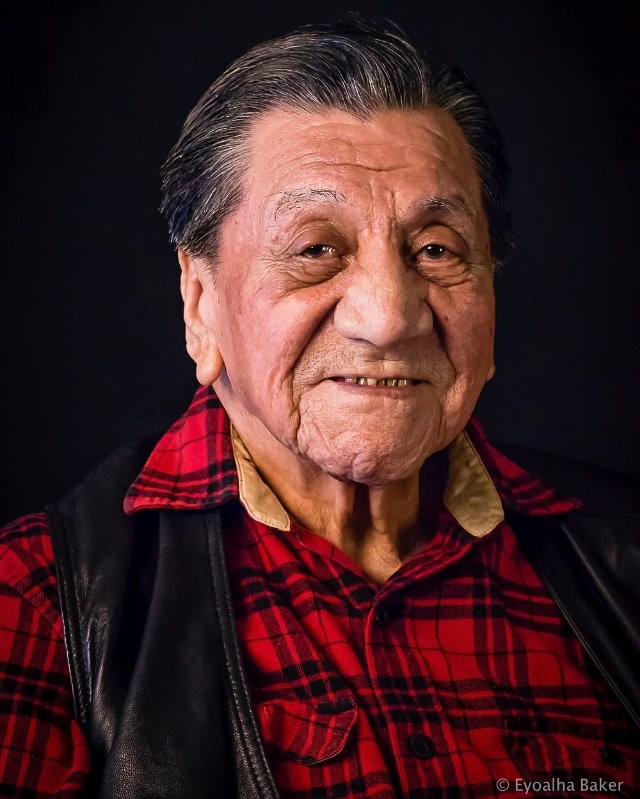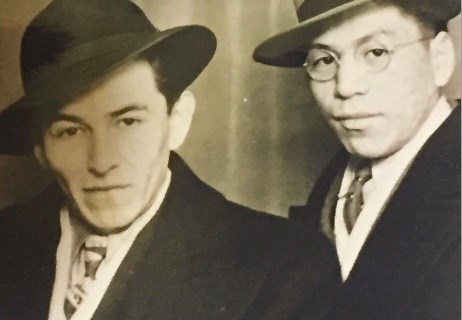With his passing, the world has lost one of the last original speakers of the Squamish language (Skwxú7mesh Sníchim).
Thanks to his teachings, however, Squamish Nation Elder Alex George Williams can be credited, at least in part, with the language's current revival.
Williams (Chapxelánexu -t / Xats'alánexw Tanáynexw -t ) died at Hilltop House on Jan. 18, at 90 years old.
He was born, raised and died in Squamish.
His nephew Chief Bill Williams and niece Mara Williams, said they remember their uncle as a loving and gentle jokester.
"He was a man of strength. A man of culture. He actually was a very shy, quiet and reserved man. He wouldn't step out and say, 'Look at me. I know this. I know that.' He would wait for people to come up to him and ask questions about the culture and the language," Chief Bill recalled.
"So that is so powerful to know. He had all of this knowledge of the culture. But for people to learn it, they had to sit down and get to know him. He would then start sharing.... He wouldn't say, 'This belongs to me.' He would say, "This belongs to everybody. I am glad you are here to learn.'"
He worked with the programs Teachings for For Your Grandchildren /The Squamish Language Elders Group (Tiná Ta na wa Nexwniw?n ta a i?mats) and generously gave of his time to inform the Squamish language program.
Recognizing the dwindling living speakers, representatives from the Squamish Nation Education Departments from the Squamish Valley and North Vancouver met with Williams to learn and practice the language.
This went on for years.
"That was something he was really proud of," Mara said of his significant contribution to continuing the language.
Recordings were made of Williams, and of other first language speakers, so that future generations can continue to hear Skwxú7mesh Sníchim spoken authentically.

His upbringing
Williams grew up with his parents Chief George and Monica Williams on the Seaichem Reserve in Brackendale.
Williams was very proud of his father's legacy, Chief Bill said.
Chief George was raised in the most northern village of the Squamish Nation and was considered a leader in his community, Chief Bill told The Squamish Chief.
He was known for stopping two Lillooet men who were abducting a woman from his village when he was just 14 years old.
Word soon got out to the non-native community, including the local police.
They recognized that the Indigenous population policed their own communities and eventually gave Williams' father an official badge, Chief Bill added.
Williams held on to that silver badge, which reads "Indian Police No. 3," his entire life. It hung on his wall at Hilltop House.

Self taught
Williams never attended a formal school of any kind and at the age of 13, he began a lifelong career in the forest industry.
His mother helped him avoid the residential school fate that many of his peers suffered.
"His older brother, David Williams... had gone to Grade 3 in the residential school system and found out how they treated the children," Chief Bill said.
When Williams was six years old, the Indian agents came around the Seaichem Reserve to take the kids off to residential school.
[These agents were the enforcement arm of the federal government on First Nations reserves from the 1830s to the 1960s.]
Williams' mom gave him a loaf of bread and a knife and sent him out into the fields, telling him not to come back until after dark.
The ritual was repeated every September for years.
"Eventually all the kids got picked up and taken off to school, but he never got sent," Chief Bill said.
Though he wasn't formally educated, he was an amateur historian with a sharp memory and loved to share stories of his life, growing up on Seaichem Reserve, logging, his family and friends, Mara added.
Logging career
Logging was central to Williams' life.
He lied to get the job, saying he was 16, when he was only 13.
"One of the stories is Uncle Alex not knowing how to drive, yet he was driving one of the vehicles on the site, but he was driving it in reverse rather than in drive," Mara said, with a laugh.
Co-workers have told the family that Williams gave everyone nicknames on the job.
When he started, he spoke Squamish, not any English.
He learned English from the guys on the job.
A jokester
Williams had a fantastic sense of humour and loved to laugh.
Chief Bill recalls seeing his uncle trick his own mother.
When the first telephones were installed in Squamish, they worked with an operator directing the call for users.
"Uncle Alex had a line put in his house and then paid to put a line into his mom's house," Chief Bill recalled.
At first, Williams' didn't explain to his mom how it worked.
"He rang from his house to his mom's house... she could only speak Squamish and he started speaking Squamish to her."
His mom was so shocked to hear the voice — which was speaking Squamish — coming out of the phone, that she threw it down.
"She got a scare," Chief Bill said, with a chuckle.
Mara remembers that even when he lived at Hilltop House he would tease waitresses or taxi drivers when they went out.
A house of love
Mara also remembers the love in Williams' home when she was growing up. Williams was married to his late wife Irene, who was originally from Mount Currie, for 53 years.
"That was his only love," Mara said.
The couple, who met when they were 20 years old, raised their children in the Northyards.
"He was like my second dad. I spent so much time over at his house with his grandkids. He raised five of them. He always had nicknames for them," she recalled.
"It is a great memory. There were always kids around. We were always at Uncle Alex's house or they were at our house."
She recalls her uncle pulling up after work in his crummy and all his grandkids would rush out to greet him.
"He worked hard for his family, loved his wife and kids, was always clean-shaven and with a fresh haircut and wore his favourite aftershave," she said. "He was the epitome of a gentleman from his generation."
A funeral service was held for Williams at Totem Hall on Jan. 24.
*Please note, this story has been corrected since it was first published to amend Monica Williams' name. Originally, it read Sara Monica Williams, but that was based on incorrect information.


